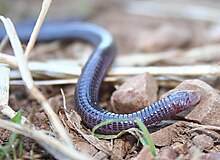Blanus
| Blanus | |
|---|---|

| |
| Iberian worm lizard (Blanus cinereus) | |
| Scientific classification | |
| Domain: | Eukaryota |
| Kingdom: | Animalia |
| Phylum: | Chordata |
| Class: | Reptilia |
| Order: | Squamata |
| Clade: | Amphisbaenia |
| Family: | Blanidae Kearney 2003 |
| Genus: | Blanus Wagler, 1830[1] |
Blanus, also known as worm lizards, are a genus of amphisbaenians found in the Mediterranean region of Europe and North Africa.[2] Like other amphisbaenians, Blanus species are specialized for a subterranean existence, with long, slender bodies, reduced limbs, and rudimentary eyes. Their skulls are powerfully constructed, allowing them to push through soil to create a burrow. Their jaws are well-developed, with large, recurved teeth and a pair of canine-like teeth in the upper jaw.
Four to seven extant species are currently known. The relationships of Blanus to other worm-lizards are not clear. The genus was formerly included in the Amphisbaenidae. More recent analyses suggest that blanids are more primitive, and are either related to Bipes[3] or represent an even more ancient lineage.[4]
A number of fossils from Europe have been referred either to Blanus or to the Blanidae.[5]
Species

The genus contains the following species:[6][7]
- Blanus alexandri Sindaco, Kornilios, Sacchi & Lymberakis, 2014
- Blanus aporus Werner, 1898
- Blanus cinereus (Vandelli, 1797) – Iberian worm lizard
- Blanus mariae Albert & Fernández, 2009
- Blanus mendezi† Bolet et al., 2014
- Blanus mettetali Bons, 1963 – Moroccan worm lizard
- Blanus strauchi (Bedriaga, 1884) – Turkish worm lizard
- Blanus tingitanus Busack, 1988
References
- ^ Wagler, J. 1830. Natürliches System der AMPHIBIEN, mit vorangehender Classification der SÄUGTHIERE und VÖGEL. Ein Beitrag zur vergleichenden Zoologie. Munich, Stuttgart, and Tübingen: J.G. Cotta. vi + 354 pp. + one plate. (Genus Blanus, p. 197).
- ^ Albert, E. M.; Zardoya, R.; García-París, M. (2007). "Phylogeographical and speciation patterns in subterranean worm lizards of the genus Blanus (Amphisbaenia: Blanidae)". Molecular Ecology. 16 (7): 1519–1531. Bibcode:2007MolEc..16.1519A. doi:10.1111/j.1365-294X.2007.03248.x. PMID 17391273. S2CID 26071914.
- ^ Vidal, N.; Azvolinsky, A.; Cruaud, C.; Hedges, S. B. (2007-12-11). "Origin of tropical American burrowing reptiles by transatlantic rafting". Biology Letters. 4 (1): 115–118. doi:10.1098/rsbl.2007.0531. PMC 2412945. PMID 18077239.
- ^ Kearney, M.; Stuart, B. L. (2004). "Repeated evolution of limblessness and digging heads in worm lizards revealed by DNA from old bones". Proceedings of the Royal Society B: Biological Sciences. 271 (1549): 1677–1683. doi:10.1098/rspb.2004.2771. PMC 1691774. PMID 15306287.
- ^ Augé, M. L. (2012). "Amphisbaenians from the European Eocene: A biogeographical review". Palaeobiodiversity and Palaeoenvironments. 92 (4): 425–443. Bibcode:2012PdPe...92..425A. doi:10.1007/s12549-012-0104-6. S2CID 129023376.
- ^ Blanus at the Reptarium.cz Reptile Database. Accessed 18 January 2014.
- ^ Blanus Wikispecies.
![]() Media related to Blanus at Wikimedia Commons
Media related to Blanus at Wikimedia Commons
